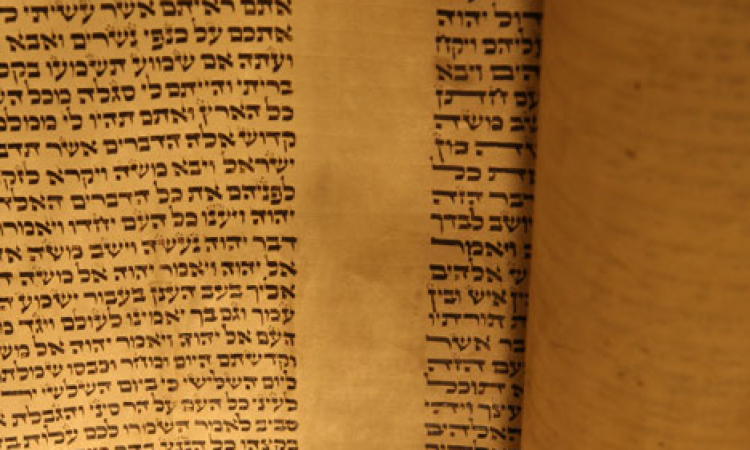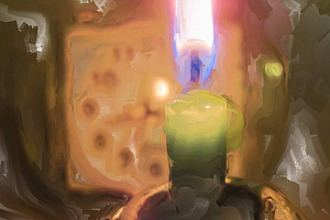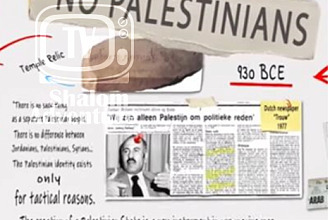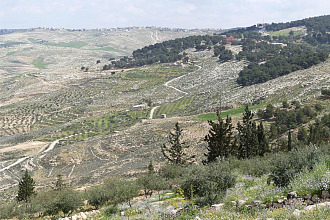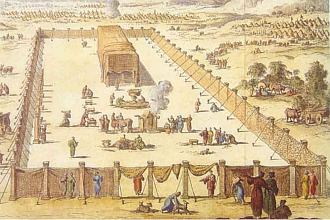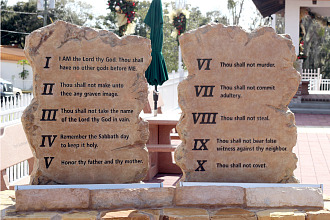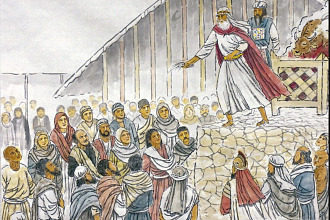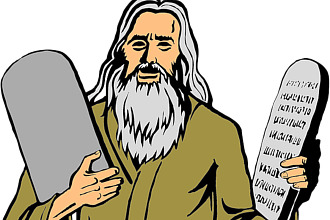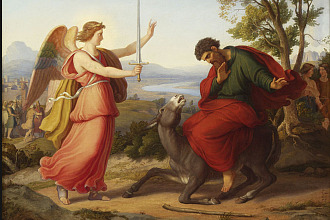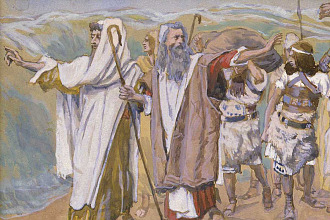Parasha for the Week: Devarim Deuteronomy 1:1 – 3:22
Haftarah for the Week: Isaiah 1:1 – 27
Apostolic Writings: Romans 15:1 - 13
Overview:
This Parasha begins the last of the Five Books of The Torah, sefer Devarim. This Book is also called Mishneh Torah, “Repetition of the Torah” (hence the Greek/English title Deuteronomy).
Sefer Devarim relates what Moshe told Bnei Israel during the last five weeks of his life, as they prepared to cross the Jordan into Eretz Israel.
Moshe reviews the mitzvot, stressing the change of lifestyle they are about to under-go: from the supernatural existence of the desert under Moshe’s guidance to the apparently natural life they will experience under Yehoshua’s leadership in the Land.
The central theme this week is the sin of the spies, the meraglim.
The parasha opens with Moshe alluding to the sins of the previous generation who died in the desert. He describes what would have happened if they had not sinned by sending spies into Eretz Israel. Hashem would have given them without a fight all the land from the Mediterranean to the Euphrates, including the lands of Ammon, Moav and Edom.
He details the subtle sins that culminate in the sin of the spies, and reviews at length this incident and its results. The entire generation would die in the desert; Moshe would not enter Eretz Yisrael.
He reminds them that their immediate reaction to Hashem’s decree was to want to “go up and fight” to redress the sin. He recounts how they would not listen when he told them not to go, that they no longer merited vanquishing their enemies miracu-lously. They ignored him and suffered a massive defeat. They were not allowed to fight with the kingdoms of Esav, Moav or Ammon these lands were not to be part of the map of Eretz Israel in the meantime. When the conquest of Canaan will begin with Sichon and Og, it will be via natural warfare.
"Why Repeating the Laws?"
Jewish scholars have asked: Why did Moshe find it necessary to review the Torah for the new generation, who was about to enter into the promised land? The Book of Devarim is Moshe’s address to the generation who were the children of the people whom Moshe led out of Egypt. Most of this generation did not witness the Exodus, the Splitting of the Sea and the Giving of the Torah. Thus, in the book of Devarim, Moshe, before his passing, re-views the many miracles which G-d performed for their parents. He also tells them of the sins their parents transgressed and the punishments which G-d inflicted upon them. Moshe conveys to them the events of the past, so that when they enter the promised land, they would not repeat the mistakes of their parents.
In the Mishne Torah Moshe wants to impress upon the generation who will be entering the Promised Land the importance of observing the commandments. For only then they will be able to inherit and dwell in the land of Israel.
"Israel's Honor"
In Parashat Devarim we see that Moses was concerned for Israel's honor. He mentions only the names of the places where the People of Israel sinned, but does not mention the sins themselves.
"Love and Compassion for Others"
The Torah states: “And you complained in your tents, and you said, because the Almighty hated us He took us out of Egypt to hand us over to Amorites to destroy us.” (Deut 1:27) Is it truly possible that the Israelites thought that the Almighty hated them? Rashi, the great commentator, explains this verse and gives us a profound insight into human nature. It is clear that the Almighty really loved the people of Israel, in the next parasha he will say: “For you are a people holy to the L-RD your G-d. The L-RD your G-d has chosen you out of all the peoples on the face of the earth to be his people, his treasured possession. The L-RD did not set his affection on you and choose you because you were more numerous than other peoples, for you were the fewest of all peoples.” (Deuteronomy 7:6-7), but because they felt hatred to-wards Him, they mistakenly felt that He hated them.
Rabbi Pakouz said that there is a strong tendency for people to project their own feelings towards others. If you constantly think that other people should not be trusted, it could show that you feel that others should not really trust you. If you always think that others disapprove of you, it indicates that you don’t approve of others — or perhaps yourself.
To use this positively, if you feel love and compassion for others, you will as-sume others feel that way towards you. Not only that, but your behavior and feelings will beget the same from the people you interact with. Try smiling at another person. You’ll feel better towards him and he’ll be more positive to-wards you!
Haftarah: Isaiah 1:1 – 27
Sunday will be the day of Tish’a B’av, the very date of the destruction of the temples of Jerusalem. Both temples were destroyed on the same day but the second more than 650 years after the first one.
The Haftara continues to give the reasons of the destruction of Jerusalem. “I reared children and brought them up, but they have rebelled against me. The ox knows its owner, and the donkey its master’s crib; but Israel does not know, my people do not understand” (Isaiah 1:3). The L-rd is so upset with Israel that he call her Gomorrah “Listen to the teaching of our G-d, you people of Gomorrah!” (10) The Almighty said to Israel that he did not like their sacrifices “What to me is the multitude of your sacrifices? says the L-RD; I have had enough of burnt offerings of rams and the fat of fed beasts; I do not delight in the blood of bulls, or of lambs, or of goats” (11). If the L-rd does not like anymore Israel’ sacrifice, it is not because G-d is against sacrifices but just because Israel’s ceremonies have lost their significance for Israel and became just rituals. That’s why the L-rd does not like not only sacrifice but also Sabbath and feasts “bringing offerings is futile; incense is an abomination to me. New moon and sabbath and calling of convocation—I cannot endure solemn assemblies with iniquity. Your new moons and your appointed festivals my soul hates; ” (13-14). The L-rd never lose hope, his people is still his people, “Wash yourselves; make yourselves clean; remove the evil of your doings from before my eyes; cease to do evil, ” (16). It is a call to repentance “Come now” (18). The L-rd is a G-d full of forgiveness and love for his people “though your sins are like scarlet, they shall be like snow; though they are red like crimson, they shall become like wool. If you are willing and obedient, you shall eat the good of the land” (19-20). Whatever Israel done in the past, G-d is willing to forgive. However, if the people don’t want to repent and to ask forgiveness, the L-rd will not be able to bless them and they will fall under the rules of other power as Babylon and many others. The text ends with a positive statement, “I will restore your judges as at the first, and your counselors as at the beginning. Afterward you shall be called the city of righteousness, the faithful city. Zion shall be redeemed by justice, and those in her who repent, by righteousness” (26-27).
Apostolic Writings: Romans 15:1 - 13
The parasha for this week, Devarim, is a review of the history of Israel in the wilderness that Moses has made in the last days of his life, according to the Jewish tradition, during the last month of his existence on the earth. This Parasha is about G-d’s blessings upon the people of Israel during the 40 years in the desert. Moses says: “For the L-RD your G-d has blessed you in all the work of your hands. He knows your going through this great wilderness. These forty years the L-RD your G-d has been with you. You have lacked nothing.” (Deuteronomy 2:7). And G-d’s request is to trust him: “You shall not fear them, for it is the L-RD your G-d who fights for you.” (Deuteronomy 3:22)
The Brit Hachadasha or Apostolic Writings requests the same trust in G-d. “May the G-d of hope fill you with all joy and peace as you trust in him” (Romans 15:13), this trust in him will help us in our life through the Ruach Elohim (Holy Spirit), which was represented in the wilderness by the Shechina (the cloud which covered the tent of meeting, and filled the tabernacle), and inspired Moses when he wrote the Torah and the book of Job.
The great revelation of the Apostolic Writings is that the Ruach Elohim is available for everyone who trust G-d and wants to build his life with Him.
The life of Yeshua will always be an example for us, as Shaul said: “Let each of us please his neighbor for his good, to build him up. For Mashiach did not please himself, but as it is written, 'The reproaches of those who re-proached you fell on me.' For whatever was written in former days was written for our instruction, that through endurance and through the encouragement of the Scriptures we might have hope.” (Romans 15:2–4). What has been written in the Bible, has been written for our instruction, that is why it is good to meditate every day on G-d's Word, especially on the Parashiot which give us the stories of G-d's people from the very beginning of her history (Genesis) to the death of Moses (Deuteronomy). I affirm that everything is in these five books which are called the Torah or Pentateuch. After Deuteronomy, the historical part of the Bible (Joshua, Judges, Samuel 1 and 2, Kings 1 an 2 etc.) Help us to discover through the successes and failures of Israel how to please G-d, how the people of Israel practiced or not the way of living described in the Torah. The Torah contains everything we need to know to live a life according to the rules of G-d.
However this life has been difficult, the people of Israel learned through their sufferings that living on the earth is not living in paradise, they had to fight against physical and spiritual enemies, that is why the Apostolic Writing and the example of Yeshua are crucial for our lives. The text of Romans con-tinues: “May the G-d of endurance and encouragement grant you to live in such harmony with one another, in accord with Mashiach Yeshua, that together you may with one voice glorify the G-d and Father of our L-rd Yeshua HaMashiach. Therefore welcome one another as Mashiach has welcomed you, for the glory of G-d.” (Romans 15:5–6). It is always good to remember that if G-d allowed prophets to write under the inspiration of the Ruach Elohim, it was to help us in our daily life. All the events that happened to the people of Israel were written to educate us.
Let's be sure to understand here that we are not better than the people of Israel of the ancient time, if we were living three thousand years ago, I am sure that we would have committed the same mistakes and the same sins, but our advantage today is that we have the full G-d’s Word, which helps us to understand their mistakes and not to renew them. The Bible was not completed during the time of Israel, but was in the process of being written.
As the Jewish people are remembering these days the destructions of the two Temples of Jerusalem (Tisha Be'Av), let's remember that all the sources of the Jewish tradition agree to say that the temples were destroyed because of the sins of Israel, free hatred, and lack of love for one another. It is our privilege to follow G-d today, to trust him and to demonstrate to the world and to G-d that the Bible has not been written for nothing. It is the unifying element between Gentiles and Jews through the Messiah: “For I tell you that Mashiach became a servant to the circumcised to show G-d’s truthfulness, in order to confirm the promises given to the patriarchs, and in order that the Gentiles might glorify G-d for his mercy. As it is written, 'Therefore I will praise you among the Gentiles, and sing to your name'.” (Romans 15:8–9). It is our ultimate authority to discover G-d’s love for each one of us, Jews and Gentiles. “May the G-d of hope fill you with all joy and peace in believing, so that by the power of the Holy Spirit you may abound in hope.” (Romans 15:13).

